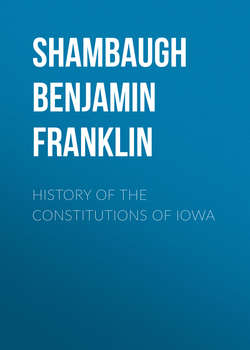Читать книгу History of the Constitutions of Iowa - Shambaugh Benjamin Franklin - Страница 3
II
A DEFINITION
ОглавлениеDefinition is always difficult; it may be tiresome. But when a term has come to have many different meanings, then no one who seriously desires to be understood can use it in the title of a text without at least attempting a definition. This is true of the word "Constitution," which in the literature of Political Science alone has at least three distinct meanings corresponding to the three points of view, that is, the philosophical, the historical, and the legal.
From the view-point of Political Philosophy the word "Constitution," stands for the fundamental principles of government. It is the sum (1) of the general and basic principles of all political organization by which the form, competence, and limitations of governmental authorities are fixed and determined, and (2) of the general and basic principles of liberty, in accordance with which the rights of men living in a social state are ascertained and guaranteed. In short, it is the sum of the ultimate principles of government.
But from the view-point of Historical Politics this word has a different connotation. Consider, for example, the political literature that appears under such headlines as "Constitutional History" or the "History of Constitutional Government." Here Constitution means not abstract philosophic principles of Government, but concrete political phenomena, that is, political facts. Our constitutional historians do not as a rule deal directly with the ultimate principles of government; but they are concerned rather with their progressive phenomenal manifestations in the assembly, the court, the office, the caucus, the convention, the platform, the election, and the like. Thus Constitutional History is simply a record of concrete political facts.
It is, however, in the literature of Jurisprudence that the term "Constitution" is used in accordance with an exact definition. Constitutional Law, or the Law of the Constitution, means a very definite thing to the Jurist. It stands (at least in America) for a written instrument which is looked upon "as the absolute rule of action and decision for all departments and officers of government.. and in opposition to which any act or regulation of any such department or officer, or even of the people themselves, will be altogether void." In this sense a Constitution is a code of that which is fundamental in the Law. To be sure, this code or text, as everybody knows, does not provide for all that is fundamental in government. It usually contains much that is temporary and unimportant. But to the American Jurist all that finds expression in the written document labeled "Constitution" is Constitutional Law. Accordingly, he defines the Constitution as the written or codified body of fundamental law in accordance with which government is instituted and administered.
It is as a code or text of fundamental law that the word "Constitution" is used in the title of these pages. This is not a philosophical discussion of the ultimate principles of our government, nor an outline of our constitutional history, but simply a narrative touching the written texts or codes that have served the people of Iowa as fundamental law during the past sixty years.
